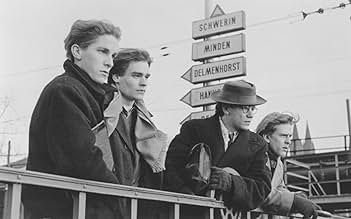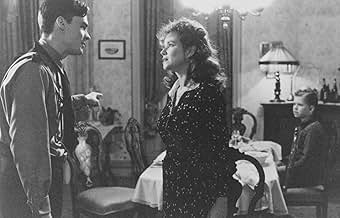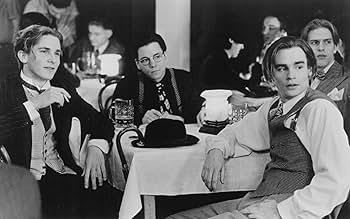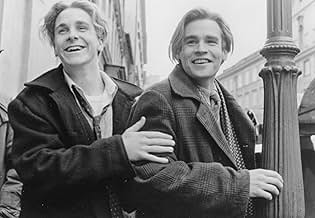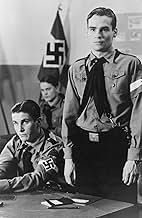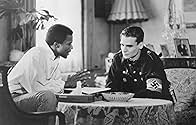VALUTAZIONE IMDb
6,8/10
17.991
LA TUA VALUTAZIONE
Un gruppo di adolescenti adora la musica proibita nella Germania nazista poco prima dello scoppio della seconda guerra mondiale.Un gruppo di adolescenti adora la musica proibita nella Germania nazista poco prima dello scoppio della seconda guerra mondiale.Un gruppo di adolescenti adora la musica proibita nella Germania nazista poco prima dello scoppio della seconda guerra mondiale.
- Regia
- Sceneggiatura
- Star
- Premi
- 1 vittoria e 1 candidatura in totale
Jessica Hynes
- Helga
- (as Jessica Stevenson)
Recensioni in evidenza
Ok for you people who refer to all the Germans as "worthless human beings" and talk about how this movie didn't focus on the holocaust, etc....WAKE UP! The point of this movie was to give another perspective on the war. Not all Germans were souless killers. Throughout the movie you could see the consciences of the main characters being pushed and pulled about what was happening. Over here in Western culture, everything is portrayed in black and white: all the Germans were completely evil, and we were the good ones. No one is denying that the Germans committed some horrific atrocities, but there were some who resisted doing those crimes, and others who actually believed that they were morally in the right because of centuries of ingrained anti-semitism. Geez, North America was anti-semitic then too! Swing Kids looks at Germany from the inside, and the different forces that were at work. Everyone knows what happened during the Holocaust....this movie wasn't about that. I think people should look at all different viewpoints before classifying all the people in a certain group (ie all of the German nation) into one cubbyhole of evil.
I have always been a very big fan of swing music and am a "Hollywood Jew". I.e., not very religious or observant of the ancient traditions, but still a Jew in humor and emotions. So this movie never fails to make my tear up. To imagine a time and place where not only your seeming friends turn on you, but you can't even listen to your kind of music is a special kind of hell on earth.
The dance and music sequences are wonderful and I can't see or hear them enough. Solid sounds, daddio! However, the film wisely preempts the reverie and jerks you back to the Nazi repression each time. It suggests how those poor "Swingkleine" must have felt. The sweet and sorrowful blend here.
Someone criticized this picture for not showing enough death. I think the boxes of human ashes and the random Brownshirt raids show enough of that! This picture isn't about the Holocaust -- it's about trying to survive when your society goes seriously wrong.
I will always think of "Swing Kids" when I hear the truism: "It don' mean a thing if it ain't got that SWING. Do-wah do-wha do-wah do-wah do-wha do-wha do-wha do-WHAAAAA".
The dance and music sequences are wonderful and I can't see or hear them enough. Solid sounds, daddio! However, the film wisely preempts the reverie and jerks you back to the Nazi repression each time. It suggests how those poor "Swingkleine" must have felt. The sweet and sorrowful blend here.
Someone criticized this picture for not showing enough death. I think the boxes of human ashes and the random Brownshirt raids show enough of that! This picture isn't about the Holocaust -- it's about trying to survive when your society goes seriously wrong.
I will always think of "Swing Kids" when I hear the truism: "It don' mean a thing if it ain't got that SWING. Do-wah do-wha do-wah do-wah do-wha do-wha do-wha do-WHAAAAA".
"Swing Kids" underperformed at the box office, received bad reviews, but today maintains a cult following. Reading the reviews from the film's 1993 release, critics seemed to be ticked off mostly by the fact that the film depicted a seemingly trivial demographic in a horrific time and place. Their argument was understandable: if such mass genocide and political corruption was taking place, why would we want to know about German teenagers who were obsessed with American swing music? My question is, why would we NOT want to know about them?
Had "Swing Kids" been released some time after Steven Spielberg's epic "Schindler's List", critics may not have been quick to bring up that point. However, "Cabaret" (1972) was also about Berlin counterculture amidst the rise of the Nazi party, and no one seemed to have a problem with that film.
"Swing Kids" is by no means a perfect film, but it also shouldn't be dismissed specifically because it doesn't take place in a concentration camp, and no one can be seen being tortured or killed. It's a small footnote, but by no means an uninteresting story.
The movie centers around Peter Muller (Robert Sean Leonard, who I couldn't help but think bore a striking resemblance to Jim Carrey in this movie), a German student barely out of his teens who, along with his friends Thomas (Christian Bale) and Arvid (Frank Whaley), love to stay out late and dance to big band swing music. They wear their hair long, own zoot suits, and are rebellious against the Nazis at first for rebellion's sake. They don't seem to be phased by the Nazi's propaganda against the Jews and other ethnicities until later in the film, although that point is not clarified well in the beginning.
Peter reluctantly joins the Nazis when his mother's significant other, Herr Major Knopp (Kenneth Branagh), pulls some strings after Peter's arrest involving a stolen radio. His other option is to be sent to jail, or perhaps even a concentration camp. Thomas enlists as well just to join Peter, but they ultimately don't give up their night life of Benny Goodman and Glenn Miller. However, the more Peter learns about the Nazis, the more he hates them. Thomas, on the other hand, falls into the Nazi propaganda over time.
The overall story is told pretty well here. Robert Sean Leonard is good as the moral compass of the story. Nowadays, I'm used to seeing Christian Bale in either villainous roles ("American Psycho" (2000), "The Prestige" (2006)), or as heroes with a noticeable dark side ("The Dark Knight" (2008), "Terminator: Salvation" (2009)). However, here Bale plays a guy who is a genuinely good friend at first, and his good acting made me forget about his later roles. At the same time, when his character becomes entrenched in the Nazi life, Bale somehow made this dramatic transition smoothly without seeming contrived.
Frank Whaley is also effective as the crippled friend Arvid, who can't join the Nazi army even if he wanted to because of his condition. Arvid plays jazz guitar, and knows a lot about American jazz. He is frequently bullied and beaten by Nazi soldiers his age, but still has energy to rebel. Whereas Leonard is the moral compass here, Whaley is the heart. I can't give away what happens to Arvid in this movie, but you really do feel for him as the movie progresses.
"Swing Kids" has a very good story, and characters good and bad that you really care about. Among the major weaknesses in this movie is the fact that it takes place entirely in Germany, yet none of the characters actually speak German. Normally that fact would not be a problem, but my issue was that the good guys here spoke with either American or British accents, whereas the villains (such as Branaugh) spoke with a heavy German accent. It's as if Hollywood hasn't gotten over the idea that German or Russian accents sound evil, even long after World War II and the Cold War ended. In this story, it goes without saying that accents shouldn't matter.
This is why I think the movie would have worked better as a foreign film made by Germans, rather than an American film made by the Disney company. If everyone was speaking German, allegedly evil accents wouldn't be an issue. On the other hand, "Cabaret" had good guys in it that had German accents. Why couldn't this film?
Also, perhaps I'm asking too much here, but the written epilogue at the end wasn't enough for me. Of course, as I mentioned earlier, not every film that takes place during World War II has to be dark and depressing, but it would have been nice to have received a glimpse of what these swing kids went through in concentration camps, how they coped, and whether they got out alive or not. Maybe such a broad subject could still be the basis for another movie, but just two written sentences before the credits broke the Golden Rule of Storytelling: Show, Don't Tell.
This film would have benefited from being shelved for at least a year, and perhaps being released a little while after "Schindler's List" made its run. Compared to concentration camps, young men in Germany who loved American music seems insignificant in comparison, but by no means does it discredit the alternative history lesson from being told. Critics could have been more open-minded to the movie, but the good thing is that the film now has a cult following. It still nags me that the film wasn't in German, though. At least it has historical accuracy on its side.
Had "Swing Kids" been released some time after Steven Spielberg's epic "Schindler's List", critics may not have been quick to bring up that point. However, "Cabaret" (1972) was also about Berlin counterculture amidst the rise of the Nazi party, and no one seemed to have a problem with that film.
"Swing Kids" is by no means a perfect film, but it also shouldn't be dismissed specifically because it doesn't take place in a concentration camp, and no one can be seen being tortured or killed. It's a small footnote, but by no means an uninteresting story.
The movie centers around Peter Muller (Robert Sean Leonard, who I couldn't help but think bore a striking resemblance to Jim Carrey in this movie), a German student barely out of his teens who, along with his friends Thomas (Christian Bale) and Arvid (Frank Whaley), love to stay out late and dance to big band swing music. They wear their hair long, own zoot suits, and are rebellious against the Nazis at first for rebellion's sake. They don't seem to be phased by the Nazi's propaganda against the Jews and other ethnicities until later in the film, although that point is not clarified well in the beginning.
Peter reluctantly joins the Nazis when his mother's significant other, Herr Major Knopp (Kenneth Branagh), pulls some strings after Peter's arrest involving a stolen radio. His other option is to be sent to jail, or perhaps even a concentration camp. Thomas enlists as well just to join Peter, but they ultimately don't give up their night life of Benny Goodman and Glenn Miller. However, the more Peter learns about the Nazis, the more he hates them. Thomas, on the other hand, falls into the Nazi propaganda over time.
The overall story is told pretty well here. Robert Sean Leonard is good as the moral compass of the story. Nowadays, I'm used to seeing Christian Bale in either villainous roles ("American Psycho" (2000), "The Prestige" (2006)), or as heroes with a noticeable dark side ("The Dark Knight" (2008), "Terminator: Salvation" (2009)). However, here Bale plays a guy who is a genuinely good friend at first, and his good acting made me forget about his later roles. At the same time, when his character becomes entrenched in the Nazi life, Bale somehow made this dramatic transition smoothly without seeming contrived.
Frank Whaley is also effective as the crippled friend Arvid, who can't join the Nazi army even if he wanted to because of his condition. Arvid plays jazz guitar, and knows a lot about American jazz. He is frequently bullied and beaten by Nazi soldiers his age, but still has energy to rebel. Whereas Leonard is the moral compass here, Whaley is the heart. I can't give away what happens to Arvid in this movie, but you really do feel for him as the movie progresses.
"Swing Kids" has a very good story, and characters good and bad that you really care about. Among the major weaknesses in this movie is the fact that it takes place entirely in Germany, yet none of the characters actually speak German. Normally that fact would not be a problem, but my issue was that the good guys here spoke with either American or British accents, whereas the villains (such as Branaugh) spoke with a heavy German accent. It's as if Hollywood hasn't gotten over the idea that German or Russian accents sound evil, even long after World War II and the Cold War ended. In this story, it goes without saying that accents shouldn't matter.
This is why I think the movie would have worked better as a foreign film made by Germans, rather than an American film made by the Disney company. If everyone was speaking German, allegedly evil accents wouldn't be an issue. On the other hand, "Cabaret" had good guys in it that had German accents. Why couldn't this film?
Also, perhaps I'm asking too much here, but the written epilogue at the end wasn't enough for me. Of course, as I mentioned earlier, not every film that takes place during World War II has to be dark and depressing, but it would have been nice to have received a glimpse of what these swing kids went through in concentration camps, how they coped, and whether they got out alive or not. Maybe such a broad subject could still be the basis for another movie, but just two written sentences before the credits broke the Golden Rule of Storytelling: Show, Don't Tell.
This film would have benefited from being shelved for at least a year, and perhaps being released a little while after "Schindler's List" made its run. Compared to concentration camps, young men in Germany who loved American music seems insignificant in comparison, but by no means does it discredit the alternative history lesson from being told. Critics could have been more open-minded to the movie, but the good thing is that the film now has a cult following. It still nags me that the film wasn't in German, though. At least it has historical accuracy on its side.
I really don't understand a lot of these reviewers. The movie far from trivializes anything about the Nazis, it simply tries to portray a moment before the bloodiest war in history on a smallish scale.
Would it be better to just have a movie that says "Nazis are bad and they killed six million Jews."? No, because that wouldn't be a movie.
It's like when people complained that a mini-series about Hitler's life that was supposed to be shown on TV would "humanize Hitler". Well, news flash, he WAS a human. That's the worst part, a human could do that sort of thing. What good is it to call evil-doers monsters and then leave it at that? When "Swing Kids" succeeds is when it's portraying the conflicts of youth as their country goes mad. Can anyone honestly say they feel NO sympathy for those who were forced to join the Hitler youth? It's easy to say you would have done different.
And the idea that the music being key somehow trivializes the events of WWII, um, it's based on an ACTUAL subculture, swing kids. There were lots of them and at first they were fairly lacking in politics, but later in the 40s when they were cracked down on more so by the Nazis some were more active.
It's not like the movie makers pulled the concept of kids, Nazis and swing out of their asses, which is what people seem to think.
And at least it was something, at least it wasn't giving in totally. Remember these were young kids, high-school age, nobody can expect them all to be Sophie Scholl.
Where "Swing Kids" lacks is its occasional excessive heavy-handedness. The ending is a bit excessive, something more subtle would have been better.
But as I say, the conflicts between the three main leads are fantastic and bring up questions of what you would do in such circumstances. I think the boys's indifference in respect to the Jew being beat up in the beginning of the movie is a good touch. This is NOT about the holocaust, because it was just starting and was largely unknown at the time. I hate when people can't lose what they know to watch a movie.
I recommend everyone to read some swing kids history, just look them up, it makes the movie much better and more interesting to know the facts.
This is a fairly good movie with very good acting, great great music and costumes, a great story that was influenced by deeply interesting history, and too much heavy handedness.
But seriously, who can resist a movie put out by Disney that includes the line of dialog "You're turning into a f*cking Nazi!"?
Would it be better to just have a movie that says "Nazis are bad and they killed six million Jews."? No, because that wouldn't be a movie.
It's like when people complained that a mini-series about Hitler's life that was supposed to be shown on TV would "humanize Hitler". Well, news flash, he WAS a human. That's the worst part, a human could do that sort of thing. What good is it to call evil-doers monsters and then leave it at that? When "Swing Kids" succeeds is when it's portraying the conflicts of youth as their country goes mad. Can anyone honestly say they feel NO sympathy for those who were forced to join the Hitler youth? It's easy to say you would have done different.
And the idea that the music being key somehow trivializes the events of WWII, um, it's based on an ACTUAL subculture, swing kids. There were lots of them and at first they were fairly lacking in politics, but later in the 40s when they were cracked down on more so by the Nazis some were more active.
It's not like the movie makers pulled the concept of kids, Nazis and swing out of their asses, which is what people seem to think.
And at least it was something, at least it wasn't giving in totally. Remember these were young kids, high-school age, nobody can expect them all to be Sophie Scholl.
Where "Swing Kids" lacks is its occasional excessive heavy-handedness. The ending is a bit excessive, something more subtle would have been better.
But as I say, the conflicts between the three main leads are fantastic and bring up questions of what you would do in such circumstances. I think the boys's indifference in respect to the Jew being beat up in the beginning of the movie is a good touch. This is NOT about the holocaust, because it was just starting and was largely unknown at the time. I hate when people can't lose what they know to watch a movie.
I recommend everyone to read some swing kids history, just look them up, it makes the movie much better and more interesting to know the facts.
This is a fairly good movie with very good acting, great great music and costumes, a great story that was influenced by deeply interesting history, and too much heavy handedness.
But seriously, who can resist a movie put out by Disney that includes the line of dialog "You're turning into a f*cking Nazi!"?
The central characters in this movie are unpolitical teenagers who have no concern with the larger political issues of Naziism and simply want to enjoy themselves. Their only perspective is that Nazis are stuffy, conformist jerks and no fun at all. For this reason, a number of mainstream critics (among them Ebert and Berardinelli) trashed the picture for trivializing the crimes and horrors of the Third Reich. These critics, I think, miss the point.
The value of the movie is precisely that it is trivial. There is no hindsight. The audience, like the characters, is caught up in the everydayness of everyday life in a totalitarian state. The Nazis are the government, and as far as anyone can see in 1938-39 they are going to go on being the government forever. The war hasn't happened yet. The Swastika flag flying over every post office and courthouse doesn't give them a little shudder of horror; it's as normal as the Stars and Stripes is to us. All sensible, respectable people who aren't Nazis themselves go along with the Nazis, because they have no reason not to.
Auschwitz hasn't happened yet either. Sure, there are concentration camps out there somewhere, but that has nothing to do with normal, ordinary people who behave themselves. Unless you happen to know a Jew or a political dissident yourself, what the government is doing to people like that isn't your problem.
The teen-aged lead characters find themselves in opposition and in trouble, not because they have any principled objections to the government, but simply because they find respectable culture boring and want to amuse themselves. The first reaction of authority, in the person of Kenneth Branagh's kindly Gestapo man, is that all they need is a good talking to, a second chance, and a little constructive guidance in the Hitler Youth and they'll grow up to be good citizens. He's fifty percent right; Thomas does respond positively to the comradeship and healthy outdoor activity he finds there.
The ultimate choices made by the two boys are governed not by principle but by their personal situations. Thomas has been rebelling against his cold, pompous, wealthy father, whom he loathes, and he ultimately decides that being a dutiful Nazi and denouncing the old man to the Gestapo offers him much better revenge than dancing to illegal jazz records. Peter recoils from the Hitler Youth (and from his former friend) because his own father had disappeared, perhaps into the camps, after the Nazis took power several years earlier.
There's's no hindsight in the movie's perspective, and no heroism. Instead, it gives us ordinary, everyday people dealing with ordinary everyday life as they find it, from the viewpoint of a high school student. The movie leads the adolescents who are its target audience to ask themselves an unpleasant question -- would they be any different, any more politically aware, if they were in the same situation? Indeed, would they even realize it if they were actually in the same situation now?
The implicit answer is that they probably wouldn't be all that different from ordinary non-political German teenagers in 1938, minding their own business, going about their own lives, and at most trying to carve a little more personal space than the government wants to give them. That's disconcerting and not at all flattering, which is why Swing Kids is worth watching.
The value of the movie is precisely that it is trivial. There is no hindsight. The audience, like the characters, is caught up in the everydayness of everyday life in a totalitarian state. The Nazis are the government, and as far as anyone can see in 1938-39 they are going to go on being the government forever. The war hasn't happened yet. The Swastika flag flying over every post office and courthouse doesn't give them a little shudder of horror; it's as normal as the Stars and Stripes is to us. All sensible, respectable people who aren't Nazis themselves go along with the Nazis, because they have no reason not to.
Auschwitz hasn't happened yet either. Sure, there are concentration camps out there somewhere, but that has nothing to do with normal, ordinary people who behave themselves. Unless you happen to know a Jew or a political dissident yourself, what the government is doing to people like that isn't your problem.
The teen-aged lead characters find themselves in opposition and in trouble, not because they have any principled objections to the government, but simply because they find respectable culture boring and want to amuse themselves. The first reaction of authority, in the person of Kenneth Branagh's kindly Gestapo man, is that all they need is a good talking to, a second chance, and a little constructive guidance in the Hitler Youth and they'll grow up to be good citizens. He's fifty percent right; Thomas does respond positively to the comradeship and healthy outdoor activity he finds there.
The ultimate choices made by the two boys are governed not by principle but by their personal situations. Thomas has been rebelling against his cold, pompous, wealthy father, whom he loathes, and he ultimately decides that being a dutiful Nazi and denouncing the old man to the Gestapo offers him much better revenge than dancing to illegal jazz records. Peter recoils from the Hitler Youth (and from his former friend) because his own father had disappeared, perhaps into the camps, after the Nazis took power several years earlier.
There's's no hindsight in the movie's perspective, and no heroism. Instead, it gives us ordinary, everyday people dealing with ordinary everyday life as they find it, from the viewpoint of a high school student. The movie leads the adolescents who are its target audience to ask themselves an unpleasant question -- would they be any different, any more politically aware, if they were in the same situation? Indeed, would they even realize it if they were actually in the same situation now?
The implicit answer is that they probably wouldn't be all that different from ordinary non-political German teenagers in 1938, minding their own business, going about their own lives, and at most trying to carve a little more personal space than the government wants to give them. That's disconcerting and not at all flattering, which is why Swing Kids is worth watching.
Lo sapevi?
- QuizDespite the fact that Kenneth Branagh plays a major role in this movie, he is uncredited. Reportedly, Branagh refused to be credited out of concern that he would be billed above Robert Sean Leonard, Christian Bale, and the other boys, whom Branagh proclaimed were the real stars of the film.
- BlooperAt the end of the film, when Willy is running after Peter and stops, there is clearly nothing at Willy's feet. Later, after being told "Swing Heil", he grabs an umbrella on a wet poster at his feet that clearly wasn't there before.
- Citazioni
Arvid: I would rather belong to any one... ANYONE, than belong to the Nazis like you do.
Thomas Berger: That's because you have everything backwards. Nazis go anywhere they want, do anything they want, everyone gets out of our way.
Arvid: Quiz time. Got your glasses on.
Thomas Berger: What?
Arvid: It means you don't know who your friends are.
- Colonne sonoreLife Goes to a Party
Written by Harry James and Benny Goodman
I più visti
Accedi per valutare e creare un elenco di titoli salvati per ottenere consigli personalizzati
- How long is Swing Kids?Powered by Alexa
Dettagli
Botteghino
- Budget
- 12.000.000 USD (previsto)
- Lordo Stati Uniti e Canada
- 5.632.086 USD
- Fine settimana di apertura Stati Uniti e Canada
- 1.967.957 USD
- 7 mar 1993
- Lordo in tutto il mondo
- 5.632.086 USD
- Tempo di esecuzione1 ora 52 minuti
- Colore
- Mix di suoni
- Proporzioni
- 1.85 : 1
Contribuisci a questa pagina
Suggerisci una modifica o aggiungi i contenuti mancanti


